Exploring water quality
in the classroom, the field and through games

Overview
Teaching students how to “do” science requires leadership, planning and a strong grasp of academic content. Cheney Middle School’s seventh graders had rich opportunities to understand different aspects of water quality through Rebecca Hansen’s science teaching and Tammie Schrader’s mentorship in the Washington State Fellows’ Network. Rebecca’s instructional leadership has been intertwined with the restoration of Marshall Creek, which now meanders after four years of local efforts.
What We Did
Rebecca traces her innovative teaching back to her involvement with the Washington State Fellows’ Network which Tammie Schrader has been facilitating in Educational Service District 101 since 2016. Fellows participate in professional learning and engage in leadership efforts supporting district, school, or organizational implementation of state learning standards in ELA, mathematics, and science, and the Early Learning Guidelines. The three-year program allows for deeper and expanded learning in the topics of leadership, content area knowledge, adult learning, change management, equity, use of data and analytics, and student growth. Rebecca joined the Fellows as she wanted to explore ways to shift her instruction to the Next Generation Science Standards (NGSS). Her instructional leadership includes strong collaboration with Cheney Middle School’s assistant principal, Eli Holm and Eastern Washington University (EWU).
In the first year of the partnership, Rebecca supported planting efforts to restore Marshall Creek. These activities provided an opportunity for students to grasp the importance of the seventh grade NGSS through studying native vegetation and changes in ecosystems. Students returned to the site in the spring to complete water quality testing and sample macroinvertebrate species like damselfly and water boatmen. Rebecca was especially pleased with the ways that students learned how to argue from evidence, a critical aspect of scientific reasoning.
 The seventh graders also built water filters during their class time using engineering standards. They learned about the methods of field biologists by using the filter to test quality in nearby wetlands. In spring 2020, students were not able to resume data collection due to COVID-19 so project leadership went out to the site and gathered the samples. Students analyzed the sample data in order to track the differences over time.
The seventh graders also built water filters during their class time using engineering standards. They learned about the methods of field biologists by using the filter to test quality in nearby wetlands. In spring 2020, students were not able to resume data collection due to COVID-19 so project leadership went out to the site and gathered the samples. Students analyzed the sample data in order to track the differences over time.
Rebecca also applied lessons from Tammie’s professional development, Game-Based Learning to develop and implement role playing game in a quarter long science elective called Ecoadventures. The game consists of multiple quest-like scenarios that included environmental clues to solve mysteries. For example, students were prompted to use scientific reasoning to address why cattle were dying. As students assumed different roles during their quests, the game offered opportunities for students to explore ethical questions about environmental sustainability.
Additionally, Rebecca supported EWU student teachers in their final capstone project to earn their teaching degree by instructing them on how to run effective science field trips. EWU’s education students worked with Cheney Middle School seventh graders to plant over 900 trees. This is part of a larger collaboration between the Land’s Council and Turnbull National Wildlife Refuge to work with private landowners to stop erosion and pollution within the Marshall Creek watershed.
What We Learned
Rebecca and Tammie’s collaboration offers a portrait of the ways in which place-based learning about climate science can foster innovation and student engagement. Rebecca reflected that participation in the Fellows Program helped her envision what can be possible when working with 200 seventh graders. She elaborated that Tammie modeled hands-on learning for other educators so that these instructional strategies may be brought to the field and the classroom. Rebecca explained that the professional learning community provided a safe space for ambitious science teaching, and gave her the opportunity to learn with science teachers who are trying to apply the same types of approaches with their students.


Project Reach
Educators
Students
Project Partners

Feedback
Networking with other Fellows across the state helped me answer questions about the logistics of these learning experiences. This enabled me to translate my vision for work into reality. Being part of a professional community like this is what is missing for many teachers.
Contact
For more information contact:
Tammie Schrader, Science Coordinator, ESD 101
tschrader@esd101.net
